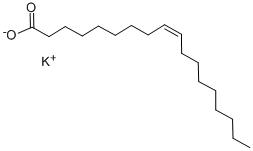A6523412
Oleamide , 70% , 301-02-0
Synonym(s):
cis-9,10-Octadecenoamide;cis-9-Octadecenamide;Oleic acid amide
CAS NO.:301-02-0
Empirical Formula: C18H35NO
Molecular Weight: 281.48
MDL number: MFCD00053638
EINECS: 206-103-9
| Pack Size | Price | Stock | Quantity |
| 25G | RMB28.80 | In Stock |
|
| 100G | RMB49.60 | In Stock |
|
| 500G | RMB140.80 | In Stock |
|
| others | Enquire |
Update time: 2022-07-08
PRODUCT Properties
| Melting point: | 70°C |
| Boiling point: | 433.3±24.0 °C(Predicted) |
| Density | 0.94 g/cm3 |
| storage temp. | -20°C |
| solubility | Soluble in chloroform (50 mg/ml), ethanol (100 mM), DMSO (~14 mg/ml), and DMF (~14 mg/ml) |
| form | Solid |
| pka | 16.61±0.40(Predicted) |
| color | White to off-white |
| Water Solubility | Insoluble in water. |
| Stability: | Stable for 2 years from date of purchase as supplied. Solutions in DMSO or ethanol may be stored at -20°C for up to 1 month. |
| InChIKey | FATBGEAMYMYZAF-KTKRTIGZSA-N |
| LogP | 6.882 (est) |
| CAS DataBase Reference | 301-02-0(CAS DataBase Reference) |
| NIST Chemistry Reference | 9-Octadecenamide, (z)-(301-02-0) |
| EPA Substance Registry System | Oleamide (301-02-0) |
Description and Uses
OOleamide (301-02-0) was originally identified in the cerebrospinal fluid of sleep-deprived cats acting as an inducer of physiological sleep in animals.1 Displays agonist activity at cannabinoid CB1 receptors (Ki=8.13 μM).2 Activates PPARγ.3 Produces vasodilator effects in rats.4 Displays neuroprotective effects5 and attenuates sepsis-induced intestinal injury6.
A brain lipid that induces physiological sleep at nanomolar quantities when injected into rats. This lipid may represent a new class of biological signaling molecules.
Safety
| Symbol(GHS) |  GHS07 |
| Signal word | Warning |
| Hazard statements | H413 |
| Precautionary statements | P273-P501 |
| Hazard Codes | Xi |
| Risk Statements | 36/37/38-43 |
| Safety Statements | 26-36-37 |
| WGK Germany | 1 |
| HS Code | 29241990 |
| Hazardous Substances Data | 301-02-0(Hazardous Substances Data) |





